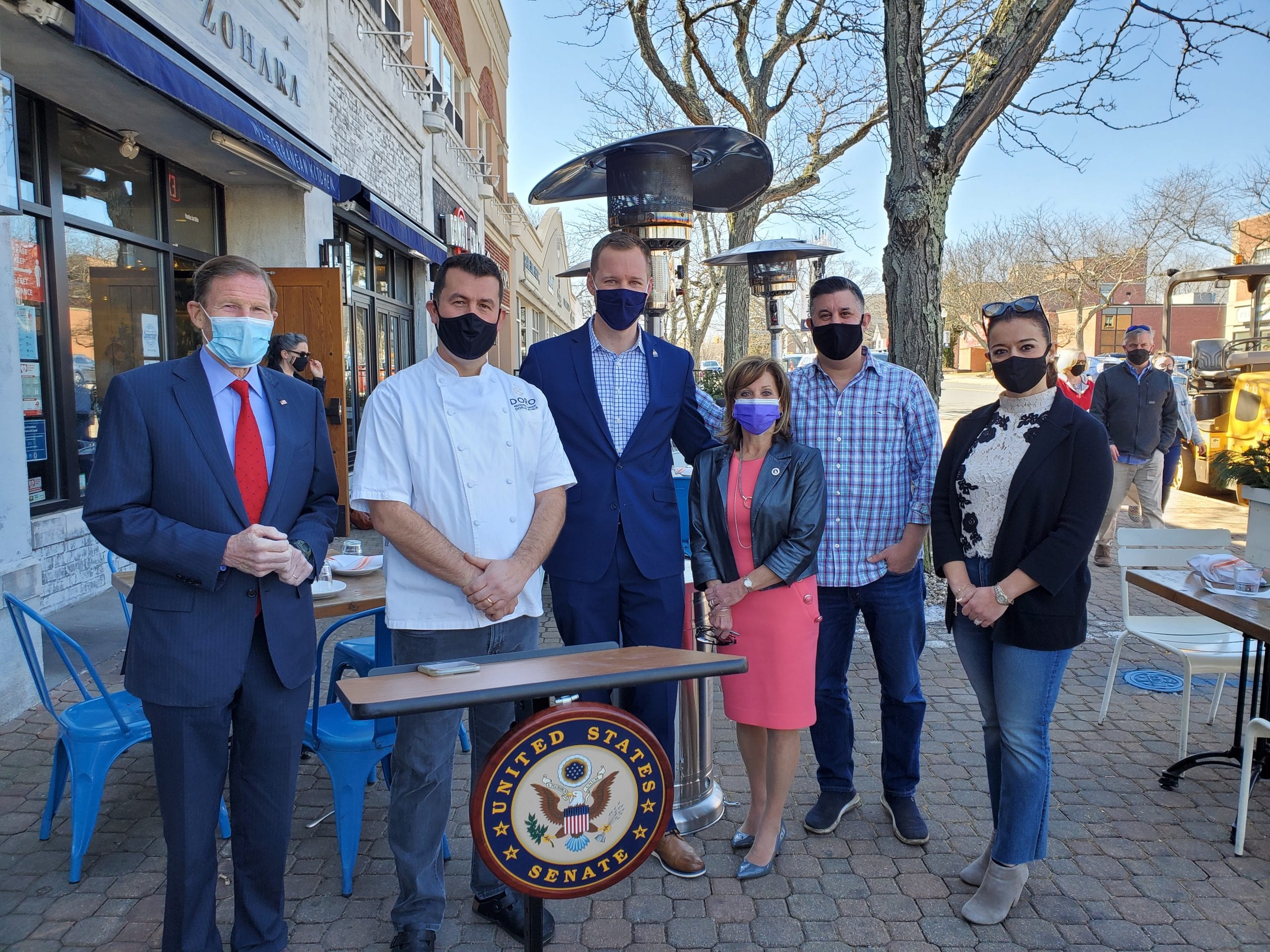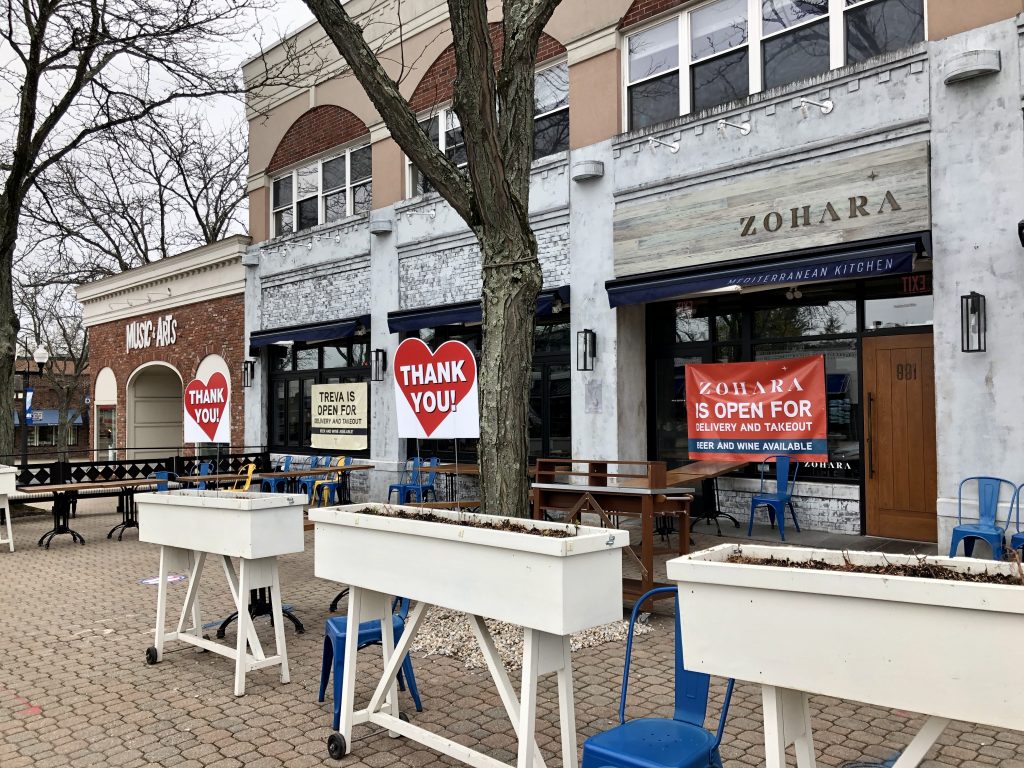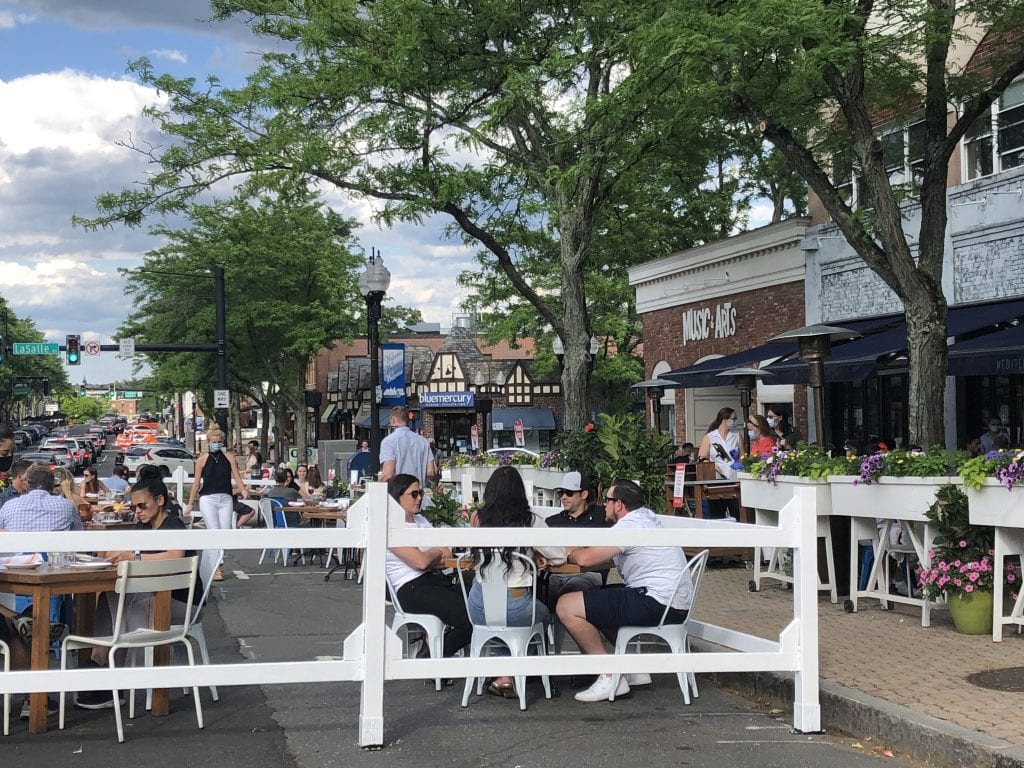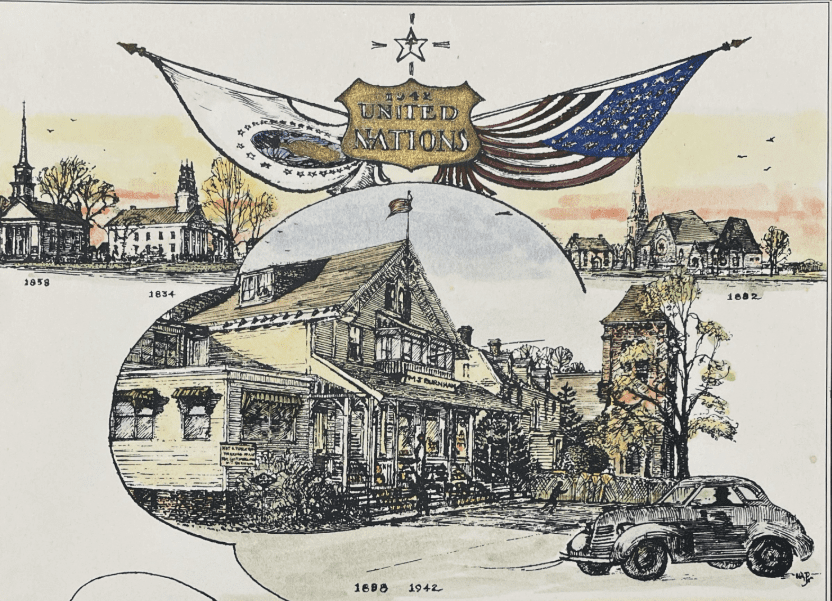West Hartford Restaurant Owners Herald Needed Relief from American Rescue Plan Act Funds

Audio By Carbonatix

From left: U.S. Sen. Richard Blumenthal, Dorjan Puka, Scott Dolch, Mayor Shari Cantor, Scott Miller, and Mira Puka. Courtesy photo
U.S. Sen. Richard Blumenthal joined DORO Restaurant Group owners, West Hartford Mayor Shari Cantor, and Connecticut Restaurant Association Executive Director Scott Dolch on Friday to talk about how the federal funds will assist their recovery.
By Ronni Newton
Not only did Friday’s weather offer a preview of spring, but for the local restaurant industry, it also provided a glimpse of a much brighter future.
“I just want to say it’s really a great day today,” said Dorjan Puka, chef/owner of DORO Restaurant Group, standing outside Zohara, one of four restaurants the group operates in West Hartford.
Not only was it a beautiful sunny day, which inspired guests to eat outdoors on the patio, “but we see light at the end of the tunnel,” Puka said, after a tough winter. Friday was in stark contrast to a year ago, when restaurants were just days away from needing to completely close down their in-person dining.
Puka expressed his thanks to U.S. Sen. Richard Blumenthal for supporting the American Rescue Plan Act. The senator met with DORO’s owners and visited Zohara at noon Friday, along with Mayor Shari Cantor and Connecticut Restaurant Association Executive Director Scott Dolch, to speak about the American Rescue Plan, and specifically the Restaurant Revitalization Fund.
“It’s a great day for our industry,” Dolch said. “It’s a landmark day,” he said, on what he didn’t want to call an anniversary but rather a milestone marking the start of a grim year for the industry.
The Restaurant Revitalization Fund, which is part of the American Rescue Plan Act, includes $28.6 billion specifically earmarked for the restaurant industry nationwide. “It won’t make them whole again, but we’re on a path,” Dolch said.
Roughly 600 restaurants have closed in Connecticut over the past year – at least temporarily – and he expressed hope that many would be able to reopen and that the grant money would keep others from closing.
Connecticut continues to vaccinate people at record pace, and as of March 19 will permit 100% capacity in restaurants, subject to continued 6-foot distancing between tables, Dolch said. The reopening, along with the funds, will mean so much for local businesses like those owned by DORO – which include Zohara, Treva, Àvert Brasserie, and DORO Marketplace in West Hartford, as well as Artisanal Burger Company in Manchester. It’s remarkable that Puka, his wife Mira Puka, and Chief Operating Officer and partner Scott Miller were able to open DORO Marketplace in the midst of the pandemic, Dolch said, while also setting up programs to feed their employees and health care workers.

Zohara, Treva, and the DORO Marketplace offered takeout at 991 Farmington Ave. in April 2020, before restaurants were able to reopen for in-person dining. Photo credit: Ronni Newton (we-ha.com file photo)
“A lot of people feel the restaurant business is easy, and painless, and fun to do … it may be fun, but it’s not easy and painless,” Blumenthal said.
Many people may dream about owning a restaurant, but don’t consider the challenges of making payroll, or having the funds to order food.
When the pandemic hit, Blumenthal said he visited restaurants across the state with Dolch.
“What I heard was a common cry: we are folding, we are going under, we are shutting our doors if we don’t get relief,” he said.
The nearly-$30 billion Restaurant Revitalization Fund will help meet that challenge nationwide, and help restaurants survive to reach that light at the end of the tunnel. That survival, he said, requires cash.
The Restaurant Revitalization Fund will provide grant money to make up the decline in gross receipts in 2020 compared to 2019 for any restaurant with receipts of less than $5 million, and specifically targeting smaller restaurants with receipts of $500,000 or less.
“Every restaurant on this street is eligible for that grant, every restaurant on this street in West Hartford, on streets in Hartford, in Torrington, all around the state of Connecticut, all around the country can get these grants to keep their doors open and go forward as we come out of the tunnel,” Blumenthal said.
The Fund will also be available to restaurants that opened during the pandemic and aren’t able to show lost revenue, Blumenthal said, based on a formula that looks at projected revenue. The program is extremely flexible and can be used for nearly every expense – including payroll, rent, supplies, food orders, and repairs.
It covers not only sit-down restaurants, but any business that serves food, including caterers and food trucks.
“It really does feel like a new day, a breath of fresh air … but also we know our country has really changed the course and is now on the path to recovery on so many levels,” Cantor said Friday.
“The American Rescue Plan was critical for restaurants that suffered so much during this pandemic,” she said, noting “the creativity the perseverance, the strength of these restaurant owners has just been beyond.”
The town was quick to act, renting jersey barriers and setting up corrals in the parking lots, roadways, sidewalks, alleys, Cantor said, and is taking measures to ensure that expanded outdoor dining, which was so successful and a lifeline for so many local restaurants, will be able to continue this year, even if the governor’s executive order allowing the zoning flexibility expires on April 20.
The Town Council is planning to vote on a temporary ordinance to extend expanded outdoor dining and retail through the end of 2021, to bring back a similar experience. “We’re going to do a permanent zoning change that will hopefully be even better,” she added.
Blumenthal, Dolch, and Miller specifically praised Cantor and the Town of West Hartford for championing the restaurant industry.
“They were leaders,” said Dolch of Mayor Cantor and West Hartford officials. He said so many restaurants call and want to mirror what West Hartford did with the dining corrals last summer.

Dining corral and patio seating outside Zohara on Farmington Avenue in 2020. Photo credit: Ronni Newton (we-ha.com file photo)
The CRA is pushing for the legislature to extend the governor’s executive order before it expires, so every town will have the ability to provide a larger footprint to help their restaurants survive.
“Patience and confidence,” Miller said.
He expressed his sincere thanks to all who supported the industry and kept things going.
“We had so much support … from the mayor, from [Economic Development Coordinator] Kristen [Gorski],” Miller said. And also from customers who value the experience of eating in a restaurant.
While despite the COVID protocols things seemed somewhat normal from June through October, in West Hartford that was because of the support of the town, and Miller said he is very grateful.
“We are beyond thrilled, from the federal government to local government … the response that everyone has taken,” said Miller. Many people who work in the industry have been displaced, but it could have been much worse. “We are looking at tomorrow,” he said.
The Restaurant Revitalization Fund, and the $1.9 trillion American Rescue Plan Act as a whole, will ensure that “the kind of hope and light that we see today I think will be mirrored even more brightly as we go through the spring to come,” Blumenthal said.
Like what you see here? Click here to subscribe to We-Ha’s newsletter so you’ll always be in the know about what’s happening in West Hartford! Click the blue button below to become a supporter of We-Ha.com and our efforts to continue producing quality journalism.




Danang Dick is everywhere! From the DMZ to West Hartford Center he’s preaching on how to live your life